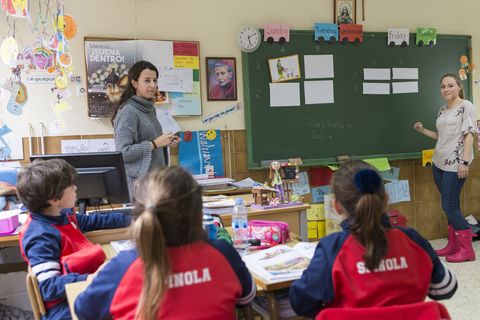
FAQs - Teach in Spain
Topics on this Page
Application Process | Job Placement | Living and Working | Travel and Arrival
Application Process
The part-time teaching assistant position for this program is truly entry-level. This means that you do not need to have classroom experience to participate! If you're inexperienced and would like some training on how to teach, we encourage you to consider signing up for a TEFL certificate, for Teaching English as a Foreign Language. See the TEFL question below for more info!
The teaching position does not require you to have Spanish skills, but it is important to immerse yourself and practice the language before you go. This will help with your transition abroad. We recommend signing up for Duolingo, taking an in person or online course, or signing up for the CIEE Spanish Immersion program before you go!
A $50 application fee is due at the time of application submission, to let us devote our effort and attention to serious applicants. Once CIEE accepts your application, a $500 non-refundable commitment deposit ($1,000 if TEFL is included) is due within 10 calendar days. The remaining balance of the program fee will be due 3-4 months before the program starts.
Each of our programs in Spain has a different total program fee, based on the features included. To see these, please visit the webpages for each program.
Besides the CIEE program fee, you will also need to pay for your visa fees and documents (approximately $300), and your plane tickets to and from Spain. You might need to travel to another state to submit your visa application at one of Spain’s 9 consulates in the USA.
We strongly recommend having about $4,500 in savings at the time you depart for Spain; carry some with you in dollars or Euros, and leave most of it in a home-country bank account that you can access via ATM card. These savings will be important to support yourself until your first paycheck, and to pay a deposit, first month’s rent, and other rental costs for your apartment.
TEFL certification is not required for the teaching assistant positions on our Teach in Spain programs, but it will give you the confidence and resources to effectively teach English to foreign language learners. Taking TEFL before you teach abroad can help you think about the English language from another perspective and understand how to teach English grammar. Teaching and preparing activities, whether for a small or large group of students, can be daunting. The students are your main priority and you want to give them the best education you can. Additionally, we strongly recommend getting TEFL certified if you are considering ESL as a career, or want to teach abroad independently in the future, as most foreign schools will require full-time teachers to be TEFL certified. Learn more about CIEE’s online TEFL certification programs!
To participate, you will need a passport with three or more blank pages, that's valid at least six months beyond the END DATE of your desired Teach in Spain program. If your passport will expire before then, renew it right away! You can still apply to our program while waiting for it to arrive, just enter "000000000" as your passport number on the application, which will signal to us that a renewal is in progress.
Yes, as long as you will receive your bachelor’s degree by the time you depart for the program. In the Diploma Upload task, please upload a letter from your advisor or registrar’s office, confirming your expected date of graduation. You can also have your school email the graduation confirmation letter to TeachinSpain@ciee.org and we would be happy to upload it for you.
Our approach is to offer a high level of preparation and support at every step of your journey toward teaching abroad. It’s different than what some of our competitors do, but based on participant feedback, we think it’s really valuable!
Before you go, we’ll guide you through the visa process and share lots of useful logistical tips and advice from former teachers. Our US-based staff is here to respond to questions by phone, text, and email. On Arrival Day, we organize an airport shuttle, and you’ll have an in-depth orientation with 4 nights of hotel accommodations provided (double-occupancy). Our in-country staff and representatives are there to support you during your experience, including 24/7 availability for emergency situations. All participants receive international travel and emergency medical insurance for the duration of their program.
Your program fee covers the costs of those services and the staff and facilities that make them possible. It’s not enough for us to just match someone up with a job and call it a day - our goal is to give them the support and preparation they need to have a successful and rewarding experience!
CIEE does offer scholarships for our Study Abroad and High School Abroad programs, but because our Teach Abroad participants receive compensation while on program, we’re not able to offer scholarships for our Teach Abroad program fees.
Job Placement

School placements are located in the Region of Madrid, in urban and suburban areas. Since you arrange your own housing, that means you have control over how long your commute is. Madrid teachers can choose to live near their schools, or commute from further away, giving everyone the option of living in the city center if they would like to. Madrid teachers will have 16 teaching hours per week, four-day work weeks, and a stipend of €1000/month.
Once accepted into a CIEE Teach in Spain program, participants are asked to pay a commitment deposit and agree to our Terms and Conditions. Once both tasks have been completed, we’ll add you to the list of participants who will receive a placement with our program. When the Madrid government has their list of schools ready (usually in May or June for Fall start dates), we work together with them to match teachers with schools, honoring teachers’ placement preferences to the extent possible. We start with the teachers who paid deposits first and continue in that order, so paying a deposit sooner means a higher likelihood (but not a guarantee) of a match with your preferences.
We begin reviewing applications on a rolling basis prior to the deadline, so it’s best to apply early!
We have hundreds of job opportunities available in Spain each fall. As long as you meet the program eligibility requirements and apply by March 1st, it’s highly likely that you will be accepted and placed. There are no selection interviews for our Language and Culture Assistant positions in Spain. We have an excellent track record with placing teachers and are normally able to find jobs for everyone that we accept!
We get this question a lot: Can couples teach in Spain together? Can friends teach in Spain together? The answer is YES! Follow these steps to request schools with a commute that lets you live with a friend or partner.
- On your application, for placement preferences, each person should list the other’s name. You will need to be flexible about age group and location within the Madrid region. Remember that even if you’re assigned schools outside the city center, you can still live together in urban Madrid and commute to work by bus.
- Apply as early as you can, ideally 6+ months before your desired start date. When it’s time to assign placements, we work in the order that commitment deposits were received (see above FAQ). If you're applying later than that, it will probably still be possible to live together, just be prepared for longer commute times.
Submit your deposits at similar times. If you pay deposits more than a few days apart, we will need to use the latest deposit date in the pair/group, not the earliest, so make sure your friend doesn’t procrastinate.
It is not always possible to place groups larger than 2 within easy commuting distance of each other. We can try, but you should be mentally prepared that the whole group may not be able to live together. You can still spend time together, of course!
Please Note: We can’t always accommodate requests for joint placement on the January start date in Madrid. January has a smaller number of placements, and unlike the Fall, the government doesn’t assign specific schools until the last minute (more details here). You can still sign up with a friend and both live in Madrid’s central districts, but it’s possible your schools may be too far away from each other to live together and have a realistic daily commute. If that’s a dealbreaker, you should consider our Fall start date instead.
All of our participants travel to Spain on Student Visas. To promote employment of Spaniards, the Spanish authorities make it difficult for non-EU citizens to get work visas. On a student visa, it will be fine if you want to work part-time as a private tutor or at a language school, but you’re not allowed to take formal jobs like at a café or travel company.
You can start tutoring whenever you want, even before your first paycheck or official teaching day. Lots of teachers do this to earn some extra money. CIEE does not assist with finding private tutoring clients, but as a native English speaker, you will be in demand! Usually you will get requests from your students, your co-teachers, or even your neighbors for tutoring help. Also, there are many Facebook groups for expats and English teachers in Spain where people often post private tutoring jobs.
Yes! The Language and Culture Assistant program allows you to renew your assignment for a second year at the same school, as long as they are happy with your performance. There’s no CIEE fee to renew – you would be a CIEE alum at that point, and the local government will guide you with the renewal process.
You can do a third year too, but the government would require you to change to a different province at that point.
Living and Working

You'll work part time at a public school as an English Language and Culture Assistant. As a native English speaker, you will be assisting classes or small groups of students in order to develop their listening and conversational skills, as well as their understanding of Anglophone culture. In many schools, you'll also teach English to members of the school staff. If you are placed in a bilingual school, you may facilitate English conversational activities in subjects such as science, art, physical education, and history.
Exact responsibilities of Language and Culture Assistants vary according to each individual school. However, you won’t be left alone with an entire class of students, nor will you be responsible for grading, discipline, or the independent supervision of students. Assistants in Madrid have 16 classroom hours per week and work four days a week. While you’re physically in the classroom 16 hours a week, you can also expect to spend time at staff meetings, special events, free periods, work gatherings, and professional development sessions on a regular basis.
Curious what it's like to teach in a Spanish vs. an American classroom? Read a former Teach in Spain participant's blog about the differences between a Spanish vs. an American school.
CIEE provides temporary accommodations when you first arrive in Madrid, but you will need to locate and pay for your own housing for the rest of your time there. Participants typically live in multi-bedroom apartments shared with other language assistants, or Spanish flatmates. Most apartments come with furnishings. On average, if you live with roommates, our teachers spend 575 euros/month on rent. Of course you can spend less (or more!) but this was average from our most recent survey.
CIEE will guide you through the housing process and you can take a look at our housing informational handout here!
There are too many participants for us to help with housing searches on the individual level, but these highly-developed resources will set you up for success!
Participants usually find housing within one to three weeks of apartment hunting. It might be stressful, but people always find a place, don’t worry! While searching for apartments, people normally stay in a hostel, hotel, or Airbnb after the CIEE orientation.
We strongly recommend waiting until you are in Spain before renting a long-term apartment. There can be scams online and it’s vitally important to visit the apartment in person before paying a deposit. If you want to start looking early, to get an idea of availability and prices, you can browse Madrid listings on Idealista.
CIEE Language and Culture Assistants in Madrid work from October to June and receive a monthly stipend of €1,000. Remember that paychecks arrive after your first month of work. On the Immersion program, there is no stipend while you are taking the language course.
For most participants, this is adequate to afford a comfortable lifestyle but it is crucial that you save before you go to Spain. We recommend having at least $4,500 in your home bank account when you arrive to start your life in Spain. If you’re careful with spending, you’ll have some money for fun and to travel around Spain. Your income will go further outside of city centers where the cost of shared accommodations, food, transportation, entertainment, etc., is lower. We will provide you with advice on how to find an affordable apartment and how to best plan your budget each month.
Most program participants also teach private English classes, either through their school or independently to supplement their income.
This blog post shows a good example of a 1000 euro budget from a recent CIEE teacher.
The stipend for Language Assistants is not considered taxable by the Spanish government. As such, you will not receive any tax documents from your income in Spain. US participants may need to report earnings to the IRS when they file their US taxes - see our US Tax Handout for a few pointers. For detailed advice or specific tax questions, we recommend consulting with a tax professional. You may find this blog post about taxes for Language and Culture Assistants helpful!
During orientation, we will explain how to set up a local bank account, since your stipend will be paid via direct deposit to a Spanish bank. It’s not possible to arrange direct deposit to a bank back home. As for US/Canadian ATM and credit cards, most financial institutions will allow you to continue to use them abroad, but you will need to contact your financial institution to discuss fees, travel alerts, and security.
Many participants chose to bring their smart phones with them and buy a Spanish SIM card and data plan. It’s important to make sure that your phone is “unlocked” before you try to do this, so contact your home country provider to ask them to unlock your phone. You can also chose to buy an inexpensive basic phone after arriving in Spain. You can choose to sign up for a service contract or select a “pay-as-you-go” option. We’ll discuss phone plan options both in our pre-departure resources and also at orientation.
It is quite casual – jeans, nice sandals, and t-shirts are fine. Tank tops and flip-flops are not okay. Don’t forget to pack warm clothes for the cool winters!
Spain has an excellent public transit system, which means you don’t need to worry about buying a car. Madrid has a world-class network of subways, buses, and commuter rail that make it easy to get from place to place in the city. To travel between cities, there are trains and coach buses available. Google Maps doesn’t always give the best information about local buses, so the best place to find those schedules is on the website of the specific city or town you’re looking at.
We send over 600 participants a year to teach in Spain, and it’s extremely rare to hear about safety issues at any of our placements. When you arrive in Spain, you will receive a lot of information about housing, so you’ll be able to make an informed choice about where to live. Spain is a developed nation with plenty of safety resources. As long as you use normal “city-smarts” you will not face any situation that is more dangerous than living in the US. You’ll also receive some tips at your orientation about common-sense safe practices while abroad. In addition you’ll also have medical coverage for unexpected illnesses/accidents, and 24/7 emergency support from our staff in Spain. You can also read more about safety and security conditions in Spain on the US State Department website. All participants are advised to enroll in the State Department STEP program, or your country’s equivalent, and it can be helpful for concerned family members as well!
This is a great question. We consider our alumni and returning teachers to be extremely valuable resources, both for us at CIEE and for our applicants. We like to invite them to serve as panelists at our orientations to help share their experiences with you, but you don’t have to wait until then to start learning from them! You can read participant blogs from Spain, and see independent reviews of our programs as well. We’re proud to say that people’s experiences on our program are overwhelmingly positive!
Travel and Arrival

Unless you have dual citizenship in an EU country or Switzerland, you’ll need a Spanish Student Visa to participate in our Language and Culture Assistant programs in Spain. For those who haven’t used one before, a visa is an official page stamped into your passport that allows you to 1) enter Spain and 2) apply for temporary residency with the local authorities. Visas are usually valid for 90 days, which is plenty of time to receive your residency documents that cover the remainder of your program in Spain. You don’t need to work on these things before you apply - we’ll guide you through it when the time comes.
CIEE will provide assistance and detailed instructions on how to apply for your visa, as well as reminders throughout the visa application season. You’ll apply at the Spanish consulate with jurisdiction over your permanent address. In most cases, you’ll need to appear in person at the consulate. It can be a little confusing and stressful, but that’s why we’re here to guide you through it!
You’ll need to wait to book flights until CIEE announces exact orientation dates by email, roughly 3 months in advance. In any case, we strongly recommend waiting to buy tickets until after you receive your visa (or buy a fully refundable flight), to protect yourself from airline change fees in the unlikely event that your visa isn’t ready on time.
We know that getting advice from someone who has done the program before is immensely helpful and valuable. That’s why we collect the best tips from our former teachers and include them in our pre-departure materials. We’ve added lots of information over the years on topics like cultural adjustments, phones, banking, and apartments, and suggestions for how to do well in your role, and we present these resources in the format of an online “course” several months before departure.
You can also read participant blogs from Spain, which is a great way to learn from our current and former teachers! In fact, one of our most popular blogs comes from a past participant who wrote about the cultural differences between Spain and the U.S.
Finally, be sure to follow us on Instagram, where you can see takeovers and “ask me anything” sessions from current participants!
In practice, it’s not possible to plan international travel in the weeks and months leading up to the program start date (unless you have an EU passport).
Participants headed to Spain in the fall must be in their home countries from June 15 onward for the visa application process. They will need to leave their passports with the Spanish consulate for a 5-6 week period of the consulate’s choosing, and may need to appear in person at the consulate as well.
The Spanish visa process is slow and unpredictable, and many consulates end up approving visas on a “just in time” basis. If your visa does arrive relatively early, then it’s OK to do some traveling at that point, it’s just not something you can predict or plan in advance.
After you’ve completed your first month of teaching, you can expect to receive that month's stipend the first week of the following month. Your paycheck is normally deposited directly into the local Spanish bank account that you open up in your first weeks in Spain.
Fall participants who arrive in August and September will start teaching at the beginning of October, and receive their first stipend payment the first week of November. There is no stipend (or teaching duties) during the months of August and September.
In most cases, the best thing to do is to find a friend or family member back home who can care for your pet while you are teaching abroad. Our orientation hotel does not allow pets or service animals. Things like vaccination requirements, quarantine, animal importation procedures, and pet hotels are beyond the scope of our program, so CIEE cannot advise or assist you with these. You will also need to research the procedures and rules for re-importing animals back into your home country when you return. It can also be difficult to find an apartment where pets are allowed. All told, it is an undertaking that can be very expensive and inconvenient.
Ready to Change Your Life?

More Information
To see locations, dates, deadlines, and a full position description, visit the Teach in Spain Program Pages.
FAQs about our 3-month Volunteer in Spain programs
See more FAQs.
More Questions? Email us or schedule a call!